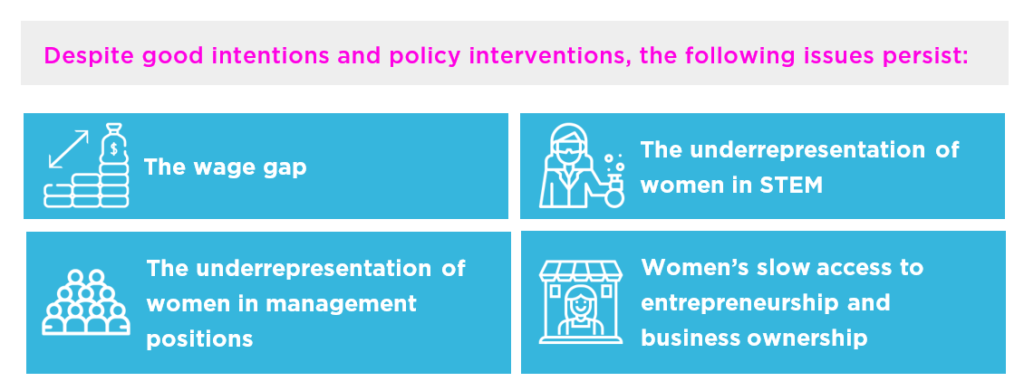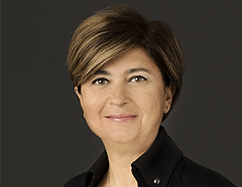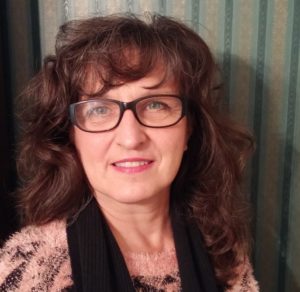Economic Equality in a Changing World: Removing Barriers to Employment for Women

Action is needed to alleviate gender barriers: Good intentions are no longer enough. Despite efforts to improve diversity in the workplace, gender inequality remains both an issue of social justice and an equally compelling economic priority.
Efforts to advance women’s economic inclusion continue to be hampered by the lack of access to information. This report summarizes existing research and prevailing issues surrounding gender inequality, including those exacerbated by COVID-19, and points to further research that needs to be done on initiatives to reduce gender inequalities.
Key Takeaways
Executive Summary
Along with technology and sustainability, inequality is one of the three dimensions that shape the economic landscape of the 21st century. Persistent inequality leads to marginalization, exclusion from growing economic sectors and erosion of the capacity for economic and social development.
Studies on the economic impact of gender gaps assume men and women are likely to be born with the same potential, but disparities in access to education, health care, finances and technology, along with legal rights and social and cultural factors, prevent women from realizing this potential.
The direct result is reduced productivity and lower economic growth. Women’s lack of economic empowerment costs the economy anywhere from 10 percent of GDP in advanced economies to over 30 percent in South Asia, the Middle East and North Africa. While Canadian women have made some progress in the labour market in recent decades, barriers to their full participation remain, thus significantly reducing the pool of talent available to employers.
Where there is equality, growth is stronger and more sustainable—the correlation is indisputable. Action is needed to alleviate gender barriers: Good intentions are no longer enough.
The first objective of this paper is to summarize existing research and take stock of prevailing issues surrounding gender inequality.
These are all well-documented factors that are interconnected and thus aggravated. We examine them in turn by highlighting the gender inequalities they generate and we present the most recent statistics as well as the explanatory determinants of these various considerations.

In portraying gender inequalities, we pay close attention to the intersectionality of the grounds of discrimination. Therefore, when available, other identity and socio-demographic characteristics such as race, immigration status, ethnicity, disability, mental health, age and income level are considered as they raise additional challenges and complexities.
The second objective is to focus on inequities made more salient by the impacts of the COVID-19 crisis and the related agreed measures that have stymied our economy and confined many families to their homes while also performing the vital function of limiting transmission of COVID-19. Many women face additional difficulties due to their over-representation in front-line work, including low-paid, precarious and care work. The overwhelming burden associated with the unequal distribution of support has further exposed women’s socio-economic vulnerabilities, with women in dual-earning households having been more likely to lose their jobs as a result of the pandemic and less likely to recover them in early stimulus and re-hiring initiatives.
Based on the findings of the first two objectives, the third objective is to present targeted initiatives to inform strategies to reduce gender inequalities and, in particular, to develop a research agenda on skills and employment that integrates a gender perspective.
Authors
Julie Cafley Ph.D.
Executive Vice-President, External Relations, Public Policy Forum

Julie is an accomplished leader and academic with expertise in higher education leadership and governance. As Executive Vice-President, for Public Policy Forum, Julie builds bridges and enhances the profile and visibility of the PPF while directing its research, external partnership and membership teams. She takes a lead role in projects about democracy and governance, reconciliation, innovation and growth.
In her previous role as Chief of Staff to two presidents at the University of Ottawa, Julie worked closely with the senior executive team to develop and advance strategic initiatives. Julie was chosen as one of the delegates for the Governor General’s Canadian Leadership Conference in 2012, and was honoured in 2010 as one of Ottawa’s top 40 under 40.
Julie is very passionate about diversity and the promotion of women in leadership roles. She is the inspiration behind cafleycommittee.org, an initiative designed to encourage the nomination and promotion of female leaders. Deeply committed to her community and to the world around her, Julie also lends her support to initiatives tackling poverty and literacy. She currently serves on the Board of Directors of Parkinson Canada.
Julie holds a PhD in education leadership from the University of Ottawa. She also holds a MEd, which examined organizational change in the higher education sector, a BEd and a BA.
Katie Davey
Policy Lead, Public Policy Forum

Katie joined PPF in March 2020. Katie has served as Director of Policy and Stakeholder Relation at the Office of the Official Opposition in New Brunswick, Senior Advisor for Policy and Stakeholder Engagement in the New Brunswick Premier’s Office, and President of the University of New Brunswick Student Union.
Feeling like the conversation around inclusive and diverse decision making was lacking on the East Coast in Canada, Katie Davey created Femme Wonk – a policy and current affairs podcast that seeks to discuss both innovative and traditional public policy through a gender and inclusion lens. Through Femme Wonk, she also speaks, consults, and hosts a book club. Once called ‘the feminist money girl,’ Katie advocates for the integration of economic and social policy.
Katie holds a Degree in Political Science from the University of New Brunswick and is currently pursuing her Master of Applied Politics at Wilfrid Laurier University.She is a member of the Youth Working Group on Gender Equality for the Government of Canada, and a 2019/20 Action Canada Fellow.
Tania Saba Ph.D.
CRHP, BMO Chair in Diversity and Governance, Professor, School of Industrial Relations, University of Montreal

Tania Saba is a professor at the School of Industrial Relations at the University of Montreal. She holds the BMO Chair in Diversity and Governance at the Université de Montréal.
Tania Saba is an expert on issues of diversity management, workforce aging, intergenerational value differences and knowledge transfer. Over the course of her career, she has contributed to more than sixty book chapters and scientific articles. She collaborates on major research projects with public and private organizations on issues of integration and adaptation in employment of disadvantaged groups.
In addition to her academic career, Tania Saba has held important executive and officer positions at the Université de Montréal. From 2008 to 2010, she became the first female director of the School of Industrial Relations. She was Associate Dean of Undergraduate Studies from 2010 to 2012 and then Associate Dean of Graduate Studies and External Affairs in the Faculty of Arts and Science at the Université de Montréal from 2012 to 2015.
Simon Blanchette, MSc.
Research Associate, Diversity Institute, Ryerson University

Simon Blanchette has been a research associate with the Diversity Institute for several years working on the organization’s seminal DiversityLeads project, the Diversity Assessment of the Superclusters for Innovation, Science and Economic Development Canada (ISED), as well as a range of projects for the Women Entrepreneurship Knowledge Hub and the Future Skills Centre.
He has presented is work in prestigious international conferences, such as the Academy of Management Annual Meeting and the European Group on Organization Studies Annual International Colloquium. Simon is a lecturer in management in the Desautels Faculty of Management at McGill University. He is the coauthor of several recent studies on women and work as well as training gaps and skills gaps in SMEs, and also has previous experience as a consultant.
He holds a Bachelor of Commerce from McGill University and Master of Science in Management (specialized in Strategy) from HEC Montreal, where his thesis focused on creative ideation and innovation
Ruby Latif
Research Associate, Diversity Institute, Ryerson University

Ruby Latif is a Doctor of Social Science candidate at Royal Roads University. She has over 15 years’ experience building strategic partnerships having cultivated relationships with over 1,000 community organizations across Ontario, and engaged with over 500 ethnic media outlets. She is a sought-after political strategist who has worked with senior leadership at all 3-levels of government.
As a Research Associate at the Diversity Institute, her research focuses on workplace diversity using an intersectional lens that goes beyond gender. Her Doctoral research seeks to understand how Muslim women in Canada construct their identities in their professional lives, and how they navigate those identities in the workplace. Her work has been published in academic journals and she has contributed to government policy documents. She hopes to use her experience and academic pursuits to drive policy change.
Ruby is a former Young Women of Distinction recipient, a Zonta Young Women in Public Affairs Award recipient and has been named one of the most influential South Asian Canadians by South Asian Generations Next magazine and has been featured nationally for her work in Canadian politics.
Valentina Sitnik
Research Assistant, Diversity Institute, Future Skills, Ryerson University

Valentina is a researcher whose focus is on ecosystem skills development and gender issues. Her background includes Master’s degrees from McMaster University (MA – English) and Brock University (MEd – Social and Cultural Contexts). Previously, her research in adult education with marginalized groups led to SSHRC funded research, focusing on post-secondary education and skills training for marginalized and previously-incarcerated women. Additionally, she has been involved in longitudinal research with adolescents and Theory of Mind at Brock University.
If you would like to get in touch with the authors of this paper, please contact:
Kathleen Powderly – Responsible Comms
kathleen@responsiblecomm.ca
For more information on the Skills Next series, please contact:
Peter Aterman – Future Skills Centre
paterman@ryerson.ca
Tomek Sysak – Public Policy Forum
TSysak@ppforum.ca




